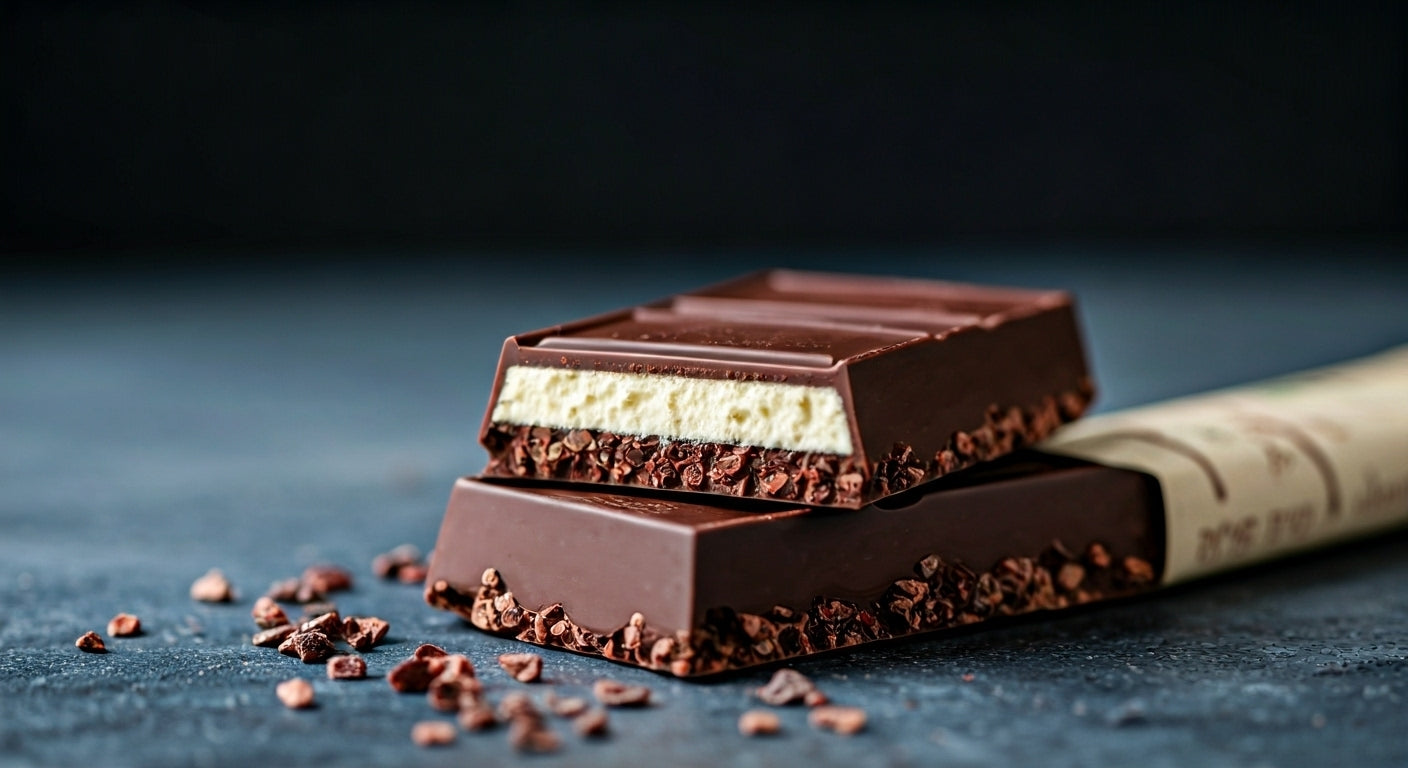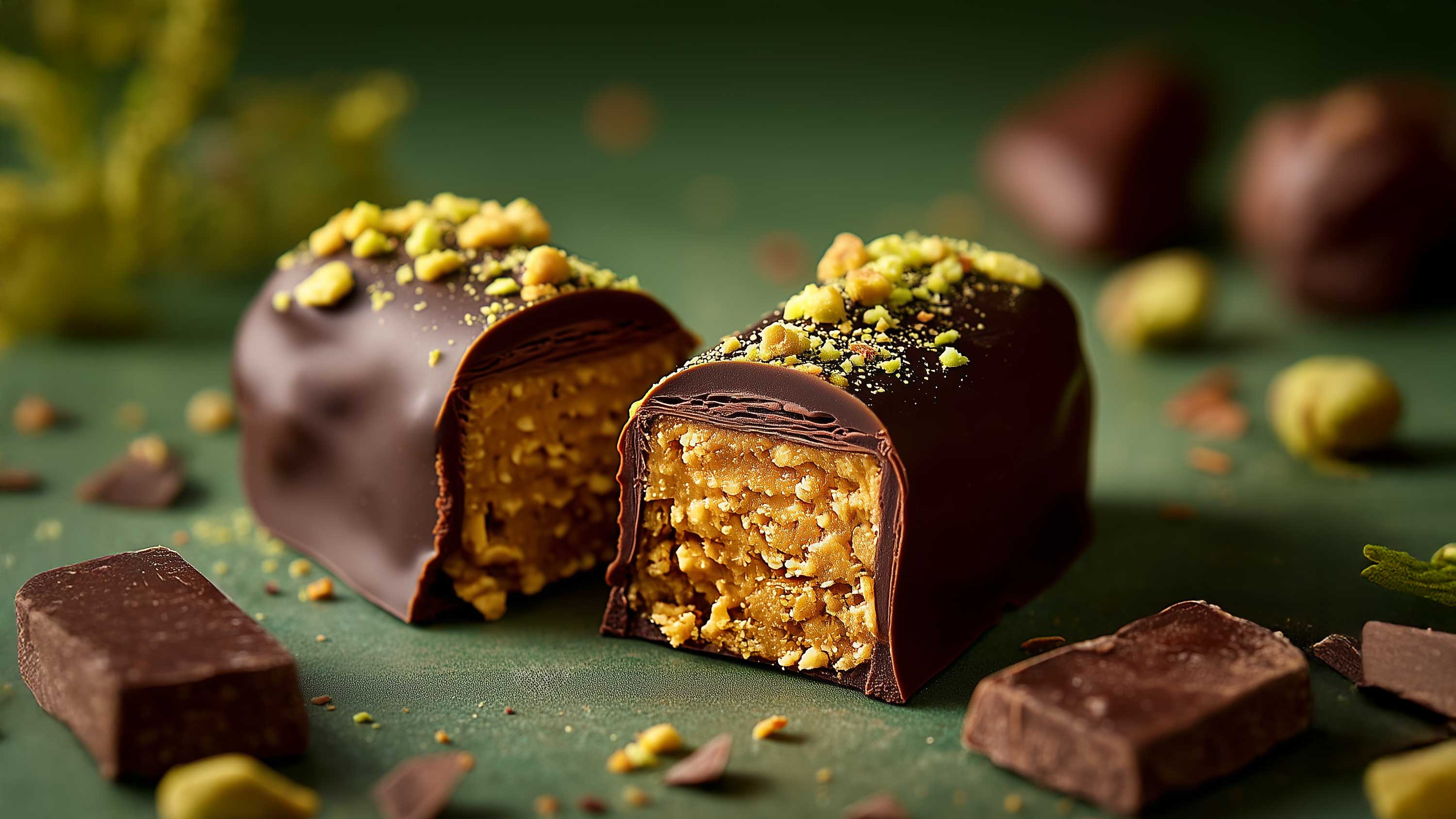
What is Vegan Chocolate? Your Complete Guide to Plant-Based Chocolate
In a world increasingly conscious of ethical consumption and dietary choices, vegan chocolate has emerged as a delicious solution for those seeking indulgence without compromise. Vegan chocolate is chocolate made entirely from plant-based ingredients, containing no animal products such as milk, butter, honey, or any other dairy derivatives. This ethical alternative proves that exceptional chocolate can be created using only plants while maintaining – and often exceeding – the flavor and quality of traditional chocolate. Let's explore everything you need to know about this revolutionary approach to chocolate making.
Understanding Vegan Chocolate Fundamentals
The Simple Definition
Vegan chocolate is chocolate crafted exclusively from plant-derived ingredients, adhering to vegan principles that exclude all animal products. Unlike traditional chocolate that often contains milk solids, butter, or honey, vegan chocolate relies on creative plant-based alternatives to achieve similar textures and flavors.
Core Components of Vegan Chocolate:
- Cacao beans or cacao-derived products (naturally plant-based)
- Plant-based sweeteners (coconut sugar, maple syrup, dates)
- Natural flavorings (vanilla beans, spices, extracts)
- Plant-based fats (cacao butter, coconut oil)
- Optional plant milk powders (coconut, almond, oat)
Our organic chocolate bars exemplify pure vegan chocolate, using only ethically-sourced, plant-based ingredients that deliver exceptional flavor while supporting sustainable agriculture.

The Ethical Foundation
Why Choose Vegan Chocolate:
- Animal welfare: No exploitation of dairy cows or other animals
- Environmental impact: Lower carbon footprint than dairy-based chocolate
- Health considerations: Often easier to digest and more nutrient-dense
- Inclusive enjoyment: Suitable for vegans, vegetarians, and lactose-intolerant individuals
What Makes Chocolate Non-Vegan
Common Animal-Derived Ingredients
Dairy Products (most common):
- Milk powder or milk solids
- Whey protein
- Casein
- Lactose
- Butter or milk fat
- Cream
Other Animal Products:
- Honey (bee-derived sweetener)
- Shellac (confectioner's glaze from lac beetles)
- Carmine (red coloring from cochineal insects)
- L-cysteine (dough conditioner, often from feathers or hair)
Hidden Animal Products:
- Bone char processed sugar (refined white sugar)
- Vitamin D3 (often derived from sheep's wool)
- Some "natural flavors" (may contain animal derivatives)
- Certain emulsifiers (potentially animal-sourced)
Processing Concerns
Cross-Contamination Issues:
- Shared equipment with dairy chocolate production
- Facilities processing both vegan and non-vegan products
- Transportation and storage with animal products
- Cleaning protocols between product runs
Our commitment to pure vegan production ensures every chocolate bar is made in dedicated plant-based facilities, eliminating any risk of animal product contamination.
Types of Vegan Chocolate
Vegan Dark Chocolate
Characteristics:
- Highest cacao content (typically 70-95%)
- Naturally easier to make vegan (fewer additives needed)
- Intense, complex flavors from pure cacao
- Rich in antioxidants and beneficial compounds
Common Ingredients:
- Organic cacao or cacao liquor
- Cacao butter (naturally vegan)
- Organic sweeteners (coconut sugar, raw cane sugar)
- Natural vanilla extract
- Optional spices or flavor additions
Vegan Milk Chocolate Alternatives
Plant-Based Creaminess: Creating the creamy texture traditionally provided by dairy requires innovative plant-based solutions:
- Coconut milk powder: Rich, tropical notes
- Cashew cream: Ultra-smooth, neutral flavor
- Oat milk powder: Mild, naturally sweet
- Rice milk powder: Light, clean taste
- Almond milk powder: Subtle nutty undertones
Texture Achievements: Modern vegan milk chocolate alternatives successfully replicate the smooth, creamy mouthfeel of traditional milk chocolate while often providing superior nutritional profiles.
Vegan White Chocolate
The Challenge: Traditional white chocolate is essentially sweetened milk solids with cacao butter, making it inherently non-vegan. Vegan white chocolate alternatives require creative solutions.
Plant-Based Approaches:
- Cacao butter base with plant milk powders
- Coconut cream for natural white color and richness
- Cashew butter for ultra-smooth texture
- Natural sweeteners to achieve proper sweetness balance
- Vanilla for authentic white chocolate flavor

Ingredients Deep Dive
Cacao: The Heart of Vegan Chocolate
Pure Plant Power: Cacao, derived from the Theobroma cacao tree, is naturally 100% plant-based and forms the foundation of all authentic chocolate, vegan or otherwise.
Forms of Cacao in Vegan Chocolate:
- Cacao beans: Whole, fermented seeds
- Cacao nibs: Crushed, roasted bean pieces
- Cacao liquor: Ground beans forming paste
- Cacao powder: Fat-removed, powdered cacao
- Cacao butter: Extracted fat from cacao beans
Nutritional Benefits:
- Antioxidants: High flavonoid content for heart health
- Minerals: Magnesium, iron, potassium, and calcium
- Mood compounds: Natural chemicals that enhance well-being
- Energy: Natural caffeine and theobromine for sustained energy
Plant-Based Sweeteners
Coconut Sugar:
- Flavor: Subtle caramel notes
- Processing: Minimally refined
- Glycemic index: Lower than refined sugar
- Sustainability: Renewable resource
Maple Syrup:
- Flavor: Rich, complex sweetness
- Nutrition: Contains minerals and antioxidants
- Processing: Natural extraction from maple trees
- Usage: Excellent in liquid chocolate applications
Date Paste:
- Flavor: Natural fruit sweetness
- Nutrition: High in fiber and potassium
- Processing: Simply ground dates
- Benefits: Whole food sweetener option
Texture and Flavor Enhancers
Natural Vanilla:
- Source: Vanilla bean pods (plant-based)
- Flavor: Complex, aromatic sweetness
- Quality: Extract vs. artificial flavoring
- Usage: Essential for balanced chocolate flavor
Plant-Based Emulsifiers:
- Soy lecithin: Derived from soybeans
- Sunflower lecithin: From sunflower seeds
- Function: Improves texture and stability
- Benefit: Creates smooth, professional texture
Health Benefits of Vegan Chocolate
Nutritional Advantages
Compared to Traditional Chocolate:
- No cholesterol: Plant-based fats only
- Often higher antioxidants: Less processing of cacao
- Mineral density: Cacao's natural mineral content uncompromised
- Digestive friendly: No lactose or dairy proteins
Specific Health Benefits:
- Heart health: Flavonoids support cardiovascular function
- Brain function: Natural compounds enhance cognitive performance
- Mood support: Cacao's natural chemicals promote well-being
- Energy: Sustained energy from natural stimulants
Dietary Compatibility
Suitable For:
- Vegans: Completely plant-based
- Vegetarians: No animal products
- Lactose intolerant: No dairy ingredients
- Dairy allergic: Safe alternative to milk chocolate
- Health conscious: Often cleaner ingredient profiles
Potential Allergen Considerations:
- Tree nuts: Some recipes include almonds, cashews, etc.
- Coconut: Technically classified as tree nut by FDA
- Soy: In lecithin or plant milk powders
- Gluten: Rarely an issue but check flavored varieties
How to Identify Authentic Vegan Chocolate
Certification and Labels
Reliable Indicators:
- Vegan Society certification
- Certified Vegan logo
- Plant-Based Food Association seal
- "Dairy-Free" statements
- Organic certification (often indicates cleaner processing)
Label Reading Strategy:
- Check for vegan symbols first
- Scan ingredient list for animal products
- Look for allergen warnings ("may contain milk")
- Verify sugar sources when possible
- Research unfamiliar ingredients
Red Flags to Avoid
Warning Signs:
- "May contain milk" statements
- Vague "natural flavors" without specification
- Multiple processing aids listed
- Unclear ingredient sourcing
- Suspiciously low prices for quality ingredients
Questions to Ask Brands
Due Diligence:
- Are all ingredients certified vegan?
- What type of sugar do you use?
- Are natural flavors plant-based?
- Do you test for dairy contamination?
- Is production equipment dedicated to vegan products?
Market Trends and Innovation
Growing Popularity
Market Statistics:
- Rapid growth: Plant-based chocolate market expanding annually
- Consumer demand: Increasing awareness of ethical consumption
- Innovation: Continuous improvement in taste and texture
- Accessibility: More mainstream availability
Driving Factors:
- Environmental concerns: Climate change awareness
- Health consciousness: Better nutritional profiles
- Ethical considerations: Animal welfare concerns
- Dietary restrictions: Growing vegan and lactose-intolerant populations
Innovation in Vegan Chocolate
Technological Advances:
- Better plant milk powders: Improved texture and flavor
- New sweetener options: Health-focused alternatives
- Processing improvements: Enhanced smoothness and mouthfeel
- Flavor development: Complex taste profiles rivaling traditional chocolate
Artisanal Movement:
- Small-batch producers: Focus on quality and ethics
- Single-origin emphasis: Terroir and cacao origin importance
- Fair-trade priority: Supporting farmer communities
- Sustainable packaging: Environmental responsibility
Coracao's Approach to Vegan Chocolate
Our Vegan Philosophy
100% Plant-Based Commitment: Every chocolate bar in our collection is naturally vegan, created using only the finest plant-based ingredients sourced through ethical, sustainable practices.
Core Ingredients:
- Organic, fair-trade cacao from Peru's Huallaga Valley
- Pure cacao butter for authentic texture
- Organic coconut sugar for natural sweetness
- Madagascar vanilla beans for complex flavor
- Himalayan crystal salt for flavor enhancement
Quality Standards
Ethical Sourcing:
- Direct farmer relationships: Supporting cacao communities
- Regenerative agriculture: Environmental stewardship
- Fair wages: Ensuring farmer prosperity
- Organic certification: Chemical-free production
Production Excellence:
- Small-batch crafting: Attention to detail
- Temperature control: Preserving nutritional benefits
- Quality testing: Consistent flavor and texture
- Transparent labeling: Complete ingredient disclosure
Featured Vegan Products
Berkeley Bar: 81% dark chocolate with maca, lucuma, and almonds Hazelnut Chocolate: Rich, nutty indulgence Salted Caramel: Sweet and salty plant-based perfection Sugar-Free Options: Health-conscious varieties
Environmental Impact of Vegan Chocolate
Sustainability Benefits
Carbon Footprint Reduction:
- No dairy industry impact: Significantly lower greenhouse gas emissions
- Sustainable cacao farming: Regenerative practices improve soil health
- Transportation efficiency: Often shorter supply chains
- Packaging innovation: Plant-based packaging options
Resource Conservation:
- Water usage: Dramatically less water than dairy chocolate production
- Land use: More efficient land utilization
- Biodiversity: Supporting ecosystem diversity through sustainable farming
- Waste reduction: Minimal processing byproducts
Ethical Considerations
Social Impact:
- Fair wages: Supporting farming communities
- Worker rights: Ethical labor practices
- Community development: Investing in cacao-growing regions
- Education: Supporting farmer education and sustainability training
Storage and Enjoyment
Optimal Storage Conditions
Environmental Factors:
- Temperature: 60-68°F (15-20°C) consistently
- Humidity: Below 50% to prevent bloom
- Light: Dark storage to preserve quality
- Air: Airtight containers for freshness
Shelf Life:
- Dark vegan chocolate: 12-24 months properly stored
- Milk alternatives: 6-12 months
- White alternatives: 6-9 months
- Raw varieties: 3-6 months
Tasting and Appreciation
Optimal Tasting Conditions:
- Room temperature: Allow chocolate to warm slightly
- Clean palate: Neutral taste before tasting
- Mindful approach: Appreciate aroma, texture, and flavor development
- Small portions: Quality over quantity for best experience
Flavor Development:
- Initial bite: Texture and immediate flavor
- Melting: How flavors develop on the tongue
- Finish: Lingering taste and aftertaste
- Complexity: Multiple flavor notes and their evolution
DIY Vegan Chocolate
Basic Home Recipe
Simple Dark Chocolate:
- 1/2 cup cacao butter, melted
- 1/2 cup cacao powder
- 1/4 cup powdered coconut sugar
- 1 tsp vanilla extract
- Pinch of sea salt
Learn detailed chocolate-making techniques through our comprehensive guide.
Creative Variations
Flavor Additions:
- Spices: Cinnamon, cardamom, chili
- Nuts: Almonds, hazelnuts, cashews
- Dried fruits: Berries, orange zest
- Superfoods: Maca, spirulina, goji berries
Frequently Asked Questions
How does vegan chocolate taste compared to traditional chocolate?
High-quality vegan chocolate often tastes superior to traditional versions due to purer ingredients and less processing. Our organic chocolate bars demonstrate that plant-based chocolate can achieve exceptional complexity and satisfaction without compromising flavor.
Is vegan chocolate more expensive than regular chocolate?
Premium vegan chocolate may cost more initially due to quality ingredients and smaller production runs. However, the health benefits, ethical considerations, and environmental impact often provide greater overall value than conventional chocolate.
Can people with nut allergies eat vegan chocolate?
Many vegan chocolates are nut-free, but always check labels carefully. Some vegan alternatives use tree nuts for texture and flavor. Our ingredient transparency ensures you can make informed choices based on your specific allergies.
Does vegan chocolate have the same health benefits as dark chocolate?
Often more so, since vegan chocolate typically contains purer cacao without dairy interference. Cacao's natural benefits including antioxidants, minerals, and mood compounds are fully preserved in quality vegan chocolate.
How can I tell if chocolate is truly vegan?
Look for vegan certification symbols, check ingredient lists for dairy products, avoid "may contain milk" warnings, and verify sugar sources when possible. Choose brands with transparent labeling and clear vegan commitments.
Is all dark chocolate automatically vegan?
No, many dark chocolates contain milk powder or other dairy ingredients. Understanding what makes chocolate vegan requires careful label reading regardless of cacao percentage.
Quick Definition Guide (Featured Snippet Optimized)
Vegan chocolate is chocolate made entirely from plant-based ingredients, containing no animal products like milk, butter, or honey. It uses cacao, plant-based sweeteners (coconut sugar, maple syrup), natural flavors, and sometimes plant milk powders. Quality vegan chocolate offers superior taste while supporting ethical consumption and environmental sustainability.
Embrace the Future of Ethical Chocolate
Vegan chocolate represents more than just a dietary alternative – it's a conscious choice that supports animal welfare, environmental sustainability, and personal health while delivering exceptional taste experiences. As consumers become more aware of their consumption's impact, vegan chocolate offers a path to indulgence without compromise.
Our collection of naturally vegan chocolate bars demonstrates that plant-based doesn't mean sacrificing quality, flavor, or satisfaction. From rich, complex dark chocolates to innovative flavor combinations, we prove that the best chocolate comes from respecting both the cacao bean and the values of conscious consumers.
Understanding what vegan chocolate is empowers you to make informed choices that align with your values while enjoying one of life's greatest pleasures. Explore our complete range of ethically-sourced, organically-produced vegan chocolates to discover how plant-based indulgence can exceed your expectations.
Learn more about the chocolate revolution through our comprehensive blog, where we share insights about vegan chocolate innovation, traditional cacao wisdom, and the art of creating extraordinary chocolate experiences that honor both your taste buds and your conscience.

Claire Bennett
I'm Claire, a chocolate lover and artisan based in a small town where I run a tiny home kitchen dedicated to exploring everything chocolate. From single-origin dark bars to creamy ganache and handmade truffles, I find joy in working with all types of chocolate. I believe chocolate has a story, and I love bringing that story to life through humble, heartfelt creations.



Leave a comment
This site is protected by hCaptcha and the hCaptcha Privacy Policy and Terms of Service apply.